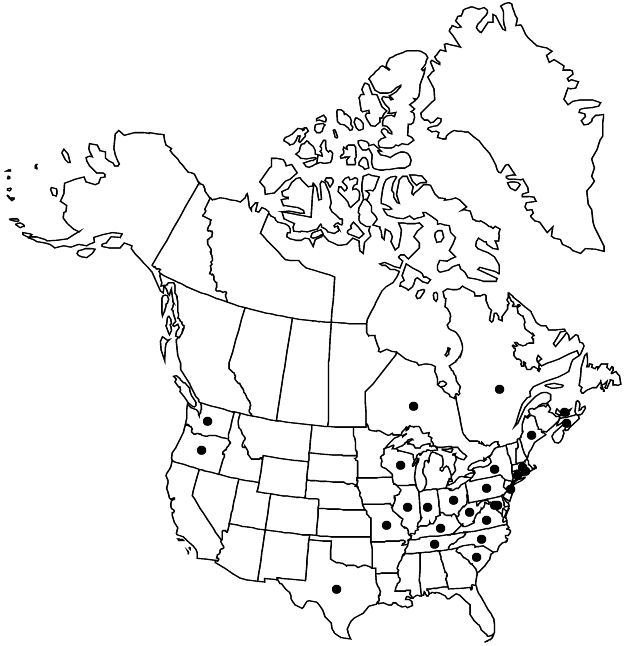Difference between revisions of "Rosa rubiginosa var. nemoralis"
in P. J. Redouté, Roses 2: 23. 1821.
FNA>Volume Importer |
FNA>Volume Importer |
||
| Line 33: | Line 33: | ||
|elevation=0–700 m | |elevation=0–700 m | ||
|distribution=N.S.;Ont.;P.E.I.;Que.;Conn.;D.C.;Ill.;Ind.;Ky.;Maine;Md.;Mass.;Mo.;N.J.;N.Y.;N.C.;Ohio;Oreg.;Pa.;R.I.;S.C.;Tenn.;Tex.;Va.;Wash.;W.Va.;Wis.;Europe;introduced also in Pacific Islands (New Zealand);Australia. | |distribution=N.S.;Ont.;P.E.I.;Que.;Conn.;D.C.;Ill.;Ind.;Ky.;Maine;Md.;Mass.;Mo.;N.J.;N.Y.;N.C.;Ohio;Oreg.;Pa.;R.I.;S.C.;Tenn.;Tex.;Va.;Wash.;W.Va.;Wis.;Europe;introduced also in Pacific Islands (New Zealand);Australia. | ||
| − | |discussion=<p>Variety nemoralis is often found near var. rubiginosa with apparently little or no ecological distinctions between them. They differ in morphological characters by degrees of expression rather than complete distinctions. The rank of variety follows, for example, the recommendation of H. J. Scoggan (1978–1979).</p> | + | |discussion=<p>Variety nemoralis is often found near <i></i>var.<i> rubiginosa</i> with apparently little or no ecological distinctions between them. They differ in morphological characters by degrees of expression rather than complete distinctions. The rank of variety follows, for example, the recommendation of H. J. Scoggan (1978–1979).</p> |
|tables= | |tables= | ||
|references= | |references= | ||
| Line 58: | Line 58: | ||
|publication year=1821 | |publication year=1821 | ||
|special status=Introduced | |special status=Introduced | ||
| − | |source xml=https://jpend@bitbucket.org/aafc-mbb/fna-data-curation.git/src/ | + | |source xml=https://jpend@bitbucket.org/aafc-mbb/fna-data-curation.git/src/8f726806613d60c220dc4493de13607dd3150896/coarse_grained_fna_xml/V9/V9_135.xml |
|subfamily=Rosaceae subfam. Rosoideae | |subfamily=Rosaceae subfam. Rosoideae | ||
|tribe=Rosaceae tribe Roseae | |tribe=Rosaceae tribe Roseae | ||
Revision as of 18:14, 18 September 2019
Prickles infrastipular and internodal, lengths ± uniform, aciculi and setae absent on flowering branches. Leaves: terminal blades mostly oval, 12–20 × 8–14 mm, apex usually obtuse, abaxial surfaces seldom densely glandular. Flowers 2–3.5 cm diam.; sepals deciduous before or as hips mature, styles usually glabrous, stylar orifice 1/5–1/6 diam. of rims 2.5–4 mm diam. Hips 10–12 × 7–9 mm. 2n = 35, 42.
Phenology: Flowering May–Aug.
Habitat: Thickets, clearings, roadsides
Elevation: 0–700 m
Distribution

N.S., Ont., P.E.I., Que., Conn., D.C., Ill., Ind., Ky., Maine, Md., Mass., Mo., N.J., N.Y., N.C., Ohio, Oreg., Pa., R.I., S.C., Tenn., Tex., Va., Wash., W.Va., Wis., Europe, introduced also in Pacific Islands (New Zealand), Australia.
Discussion
Variety nemoralis is often found near var. rubiginosa with apparently little or no ecological distinctions between them. They differ in morphological characters by degrees of expression rather than complete distinctions. The rank of variety follows, for example, the recommendation of H. J. Scoggan (1978–1979).
Selected References
None.